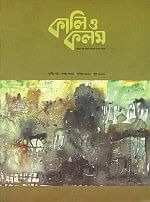On maintaining standards and catechistic listing
Khademul Islam
As we all know, it is hard to maintain standards; it can be doubly hard to do so in the case of literary journals, which eventually can settle for being something rather less than is announced with fanfare in their launching ceremonies. One is happy to see Kali O Kolom thus far bucking the odds.The June issue opens with articles on Kazi Nazrul Islam by Hayat Mahmud and Ahmed Mowla respectively. Hayat Mahmud seductively pleads for research into the unexplored areas of the poet's life in the context of the connection between an artist's work and his/her life--even though this principle, as Martin Amis has written, "surely is a long-exploded one." Mahmud does suggest intriguing possible lines of enquiry with regard to Nazrul's life. Ahmed Mowla trenchantly discusses Nazrul's short stories, pointing out that the poet "first entered Bengali literature as a short story writer." In the battlefield scene in an extract published from 'Hena,' one of the short stories discussed by Mowla, one notes that the young Nazrul was not free of clichés: "Oh! Rain of fire! And that fearful sound--gurum--droom--doom! The tiniest patch of blue sky could not be seen, it was as if the whole sky was consumed by fire!" (translation mine). Learning there is plenty in Rashid Askari's essay on writers, texts and readers, but it is in the main plowing over old ground, burdened with wearisome litspeak. Speaking generally here, there seems to be an anxiety in such pieces to name-drop, for a catechistic listing of A-list, high-octane Western literary theories/theorists. As is usual in issues of Kali O Kolom there are reviews of local artists/art-sculpture exhibitions and Bengali theater/plays, which keep the readers interested in this scene up-to-date and current. Especially valuable it seems to me in this regard is the coverage of drama/theater, since, as far as I know, there is no independent forum where there can be found critical discourse regarding drama/playwrights. In this vein, I found Sajedul Awal's assessment of Bangladeshi film criticism as attempting to strike forth in a new direction. There is also an enjoyable write-up from Toronto on an evening's get-together with Canadian poets and writers. There are a couple of graceful in memoriams: One of Indian music critic Kumarprasad Mukhopadhya, and the other of Bangladeshi poet-folklorist Mustafa Anwar, one of the immortal group responsible for the operation of the radio transmitter at Kalurghat in 1971, from which sprang the later Free Bangla Betar. Among the short stories are the very readable 'Dondokoron' by Razia Khan (who writes both in English and Bengali) and 'Rupchaya' by Kannir Rai. It is interesting to note the regular pieces by the ever-reliable stand-bys Samaresh Majumdar and Sunil Gangapadhya, as well as all the other West Bengali writers and poets featured in past volumes, and who no doubt will continue (and rightly so for in literature we should not be divisive!) to adorn future issues. Here I am forced to wonder: Where are all those righteous voice otherwise so quick on the draw against the presence of 'Indian' writers? The book reviews are substantial, though the one on Anis Chowdhury's Uponnash Shomogro by Shahjahan Hafiz is descriptive, relying entirely on plot summaries and quotations from Syed Shamsul Huq's introduction in the book. The same cannot be said of Nurul K. Nasim's timely review of Niaz Zaman's edited From the Delta: English Fiction from Bangladesh, which properly conducts its analysis within the frame of creative writing in English in Bangladesh. But by focusing at flattering length on one writer, however commendable, at the expense of others the review loses its focus on the whole book, and in fact, on the editor's purpose in publishing such a collection in the first place. It also fails to take into account the wholesale, understandably so given the context, 'Bengali-zation' policies pursued during the years following the country's independence, which may have retarded the growth of English language, and creative writing in it, to an extent felt even today. Khademul Islam is literary editor, The Daily Star.
|

Kali O Kolom, June 2006, edited by Abul Hasnat, published by Ice Media Ltd., Dhaka. |